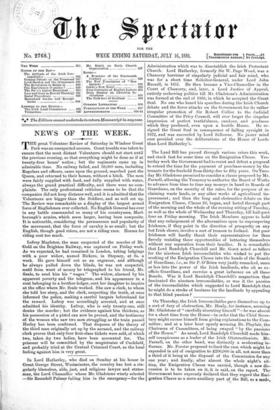The Land Bill has passed through various crises this week,
and stuck fast for some time on the Emigration Clause. Yes- terday week the Government had to resist and defeat a proposal to extend the time for the payment of purchase-money by the tenants for the freehold from thirty-five to fifty years. On Taes- day Mr. Gladstone promised to consider a clause proposed by Mr. Parnell, allowing the Treasury to authorise the Board of Works to advance from time to time any moneys in hand to Boards of Guardians, on the security of the rates, for the purpose of re- claiming waste lands, or any other works of agricultural im- provement; and then the long and obstructive debate on the Emigration Clause, Clause 26, began, and lasted through part of the morning and the whole of the evening sitting of Tuesday, as well as the whole of Wednesday and Thursday, till half-past four on Friday morning. The Irish Members appear to hold that any enlargement of the alternatives open to unprospering Irishmen, if they point in the direction of prosperity on any but Irish shores, involve a sort of treason to Ireland. But poor Irishmen will hardly thank their representatives for thus fiercely resisting these opportunities of bettering themselves without any separation from their families. It is remarkable that Lord Randolph Churchill and Mr. Gorst acted as tellers for the nineteen Irish irreconcilables who wished to put the working of the Emigration Clause into the hands of the Boards of Guardians, i.e., as Sir P. O'Brien very justly remarked, more or less into the power of the Irish landlords, who sit as ex- officio Guardians, and exercise a great influence on all these Boards. Was it Lord Randolph Churchill's magnetism that fascinated the nineteen irreconcilables, or was it the passion of the irreconcilables which suggested to Lord Randolph that he might do a stroke of business for the landlords by appealing
to that blind passion ?


































